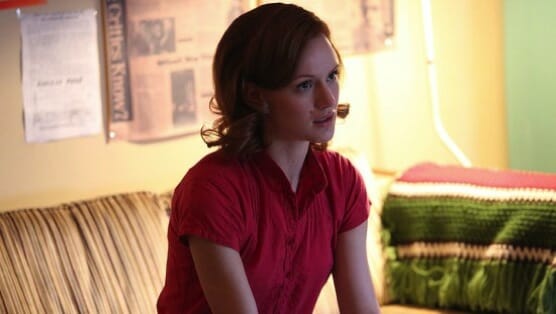Halt & Catch Fire: “10Broad36”
(Episode 2.06)

Reviewing Halt & Catch Fire’s first season was an exercise in frustration. Not because the series was frequently bad, mind you, but because its most promising, rich elements were often paired with storylines that were predictable at best, and dramatically inert at worst. It was akin to watching a beautiful flower blossom in a garden, only to have its growth stifled by adjacent weeds.
In some ways, “10Broad36” represents Season One in a nutshell. For roughly three-fourths of its runtime, the episode put forward some of the best material in the show’s history. The other fourth… well, that’s a whole other story.
Let’s start with the bad stuff first.
After learning his fatal diagnosis last week, Gordon takes an impromptu trip back home to California to stay with his wayward brother Henry (played by Kevin Rankin, AKA television’s most ubiquitous actor). Things take a turn for the narrative worse once Gordon happens upon Jules, one of his brother’s ex-flames from high school. At first the two bond over the usual innocuous small talk—children, old high school anecdotes, etc. This friendliness, however, soon morphs into simmering sexual tension after the two share a joint and Gordon begins expounding upon the “paths” he’s never taken. In a flash, the two are doing the nasty in the back of a truck like a couple of bored, small town teenagers.
Let’s dissect all the ways in which this development is problematic, shall we? On initial blush, Gordon and Jules’ flirtation parallels the fleeting dalliance that Donna had with her boss back in Season One. Whereas the latter never evolved beyond an illicit kiss, however, the former finds Gordon going all the way. On the other hand, much like the Donna/boss subplot, the incident puts forth a lazy melodramatic spin that’s simply not needed in a season already rife with struggling companies, unwanted pregnancies, complicated romantic relationships and a potential death notice.
To be fair, on paper, Gordon’s ill-advised decisions make some element of sense. He might be facing death, his wife’s been ignoring his pleas for a talk and, in the absence of a project, he’s adrift without a purpose. Unfortunately, what may work on the page just doesn’t translate here. This is not the fault of Scoot McNairy, who’s done a fantastic job at capturing Gordon’s blistering, goofy highs and devastating lows this season, but rather it involves an imbalance in characterization. Over the course of the second season, Donna has become a stronger, more assertive character who must fight against lack of resources and general sexism to see her dream fulfilled. Gordon, by contrast, has spent most of the season being rich and not knowing what to do. Even with his decline in health, his character has just not been placed in a sympathetic enough light to come back from this. Even his lighter moments, such as making a friend pick up his kids or working on the Westgroup mainframe, indicate times of majorly irresponsible behavior.
Moreover, this situation is not helped by the fact that this episode marks the first time we’ve meet either Henry and Jules. As such, we’re not given any real shading to them beyond a basic log line characterization (i.e. jealous, overlooked brother and fading high school beauty). The Gordon/Jules scenario even ends with her taking umbrage at Gordon’s emotional unloading regarding his sickness. Why she has issues with this and not the fact that he’s married with two children makes the whole encounter feel all the more contrived, with the Jules character feeling more like a plot point than the kind of three-dimensional character that Halt normally takes great pains to craft.
Capping off this whole miscalculated subplot is the fact that Gordon returns back to Henry’s house to find his brother furious about his liaison with Jules. This opens the floodgates and all the hidden subtext that has dotted the two’s conversation (i.e. Henry’s jealousy over Gordon’s life) comes to a head. In a show that’s done so well at distancing itself from the easy conflicts, this scene feels like something we’ve seen a dozens iterations of in other TV shows.
Moreover, as I indicated earlier, this subplot proves all the more egregious when paired with the rest of the episode, which signals Halt at the top of its game.
-

-

-

-

-

-

-

-

-

-

-

-

-

-

-

-

-

-

-

-

-

-

-

-

-

-

-

-

-

-

-

-

-

-

-

-

-

-

-

-








































